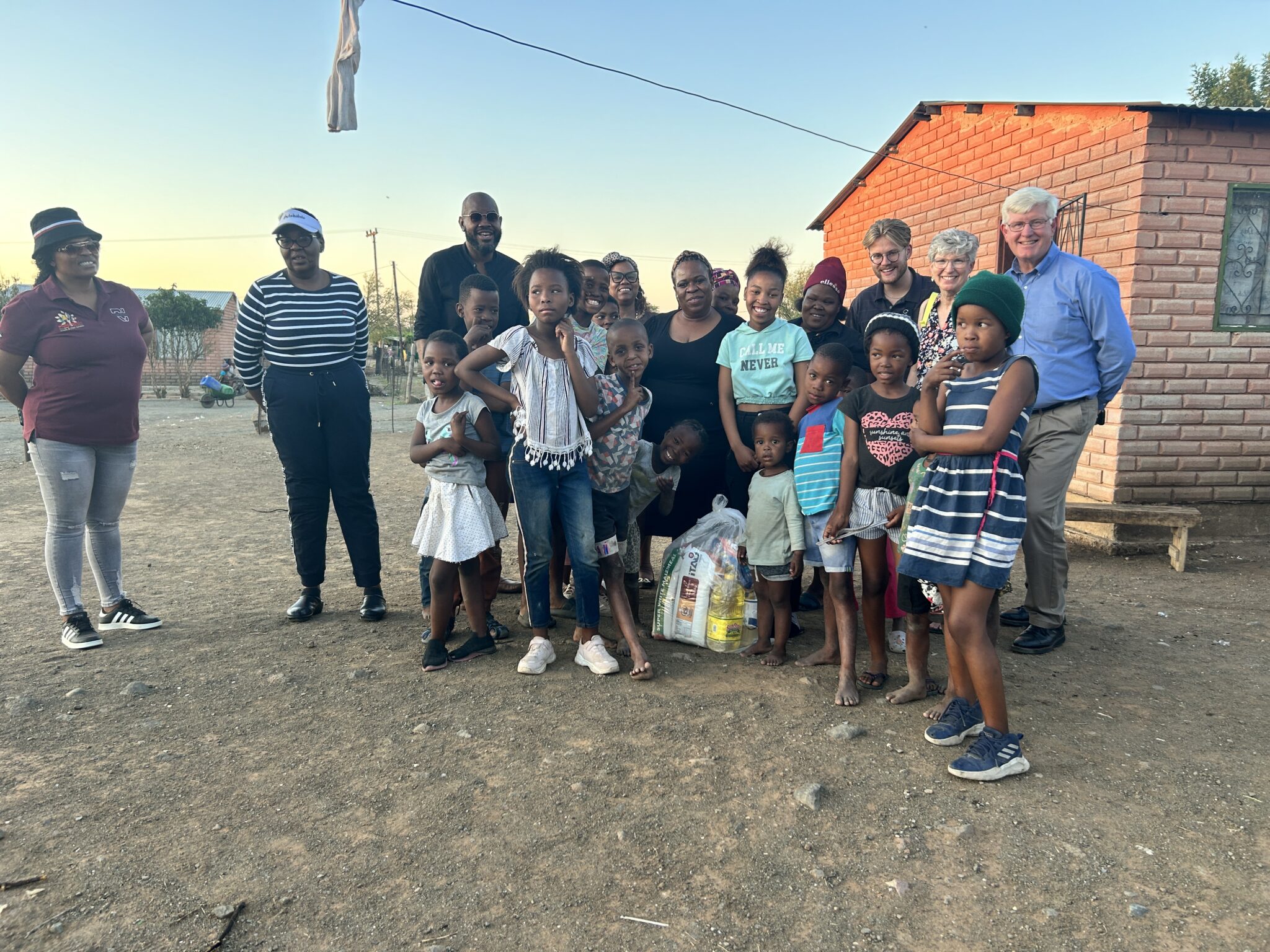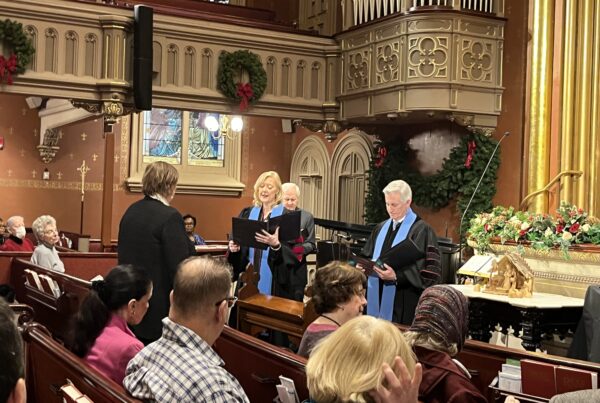During a “come and see” trip to an orphanage in South Africa, Rev. Jeremy Simpson heard something that changed his approach to racial reconciliation work: “God’s business is about creating families.” As the director of diversity and belonging for the Reformed Church in America, Simpson was inspired to let that phrase shape sankofa trips and experiences—looking at the past to learn for the present and the future—as a key part of continually discerning how to be the family of God, living together with our differences.
A life-changing trip to South Africa
One of the key objectives of the trip to South Africa was visiting Setshabelo Family and Child Services in Botshabelo and becoming more familiar with the work of these mission partners of the Reformed Church in America (RCA). Through Setshabelo, vulnerable children and orphans are taken care of and placed in loving, forever families.
“One of the women [at Setshabelo] said God’s business is about creating families,” says Simpson. “That’s everything we believe theologically! We see that in Scripture.”
Simpson points to John’s vision of heaven, found in Revelation 7:9—“a great multitude that no one could count, from every nation, from all tribes and peoples and languages”—as a beautiful picture of the family of God made clear. All kinds of differences, yet one multitude before God’s throne.
Related: Diversity and belonging: a Revelation 7:9 vision for today and the future
“For me, it really shifted the idea of sankofa to not only be space to learn from our past but also to form the family of God together,” adds Simpson. “We’re better together. We all make up the family of God together.
“Seeing and hearing the voices of the children was critical,” he adds. “In South Africa, families who don’t have children become a space where God makes family among them, because they made an intentional choice.”
In addition to that intentional choice, many of these new families were made possible through the church, says Rev. Dr. Denise Kingdom, who serves as the RCA liaison for Setshabelo Family and Child Services (SFCS). She has worried that Setshabelo would run out of families to adopt the orphans, but the church—the family of God—has become “our greatest resource,” she says.
“In South Africa, infertility is almost as shameful as being an orphan. Couples are ostracized by their families because they don’t have children. Pastors are bringing those couples to SFCS,” says Kingdom. “Through SFCS, they’re then made a loving family and also reconnected with their larger families. God’s in the business of making families. It’s amazing to see how God makes those connections.”
Sankofa is for everyone
“Sankofa” comes from a Ghanaian language and means “to retrieve.” Often symbolized by a bird with feet facing forward, head turned back, and a valuable stone in its mouth, the idea of sankofa is to look back at the past, glean both good and bad from those experiences, and use that knowledge to make a better future.
“Sankofa comes out of Africa, but it’s for everyone,” says Simpson. “In South Africa, it was cool to see what the global experience of sankofa is—how do we live in a space of unity? How do we move forward into the future, understanding our history?
“And there’s a reimagining piece,” he adds. “It takes reimagining to go forward. The same old system doesn’t work. Tweaking doesn’t work. Maybe we can morph what we have into it. But in Revelation 21, there’s a new heaven, a new earth.”
In the Reformed Church in America context, Simpson says there is a budding of sankofa all around the denomination. As part of his work, Simpson has been working to organize sankofa trips, particularly around race.
“People are getting inspired and want to step into unity. They want to journey toward racial righteousness,” he says. “As our denomination walks through a difficult time, we’re looking at stories of people who have walked before us and looking at stories of people who can walk alongside us now.”
During the trip, Simpson, Kingdom, and other travelers were also able to connect with the original authors of the Belhar Confession—and to do so around the table where the confession was discussed and drafted. The confession, a standard of unity in the Reformed Church in America, has its roots in the struggle against apartheid in southern Africa and focuses on unity, reconciliation, and justice—all key elements to living together as the family of God.
Related: Belhar Confession worship resources
“Apartheid in South Africa has deep and Dutch roots. It was a governmental system but also [embedded] in practice,” says Kingdom. “We [the RCA] have been complicit in that historically. It really creates for us a paradigm by which we get to navigate this anti-racism policy and how we actually engage in local mission. We have to have a strategic, collaborative approach to engage in local mission and church.”
A good place to start?
“Just come and see,” says Kingdom. “Then ask: what is mine to do in my community?”
Living together as God’s family
It’s heartwarming to hear of an orphaned child being adopted into a loving, forever family—or to see the grin of a child who gets to continue living with loved ones who are resourced and equipped for long-term care. But as fallen people, we know that life in families is not always easy.
“Think of the tension of family gatherings,” says Simpson, “Isn’t that the same with the family of God? We choose to intentionally look at struggle and to listen. We look at each other and say, ‘You’re not as different as I thought. We come from the same cloth.’
“First Corinthians 13 gives a model of loving each other so that we can lean into Revelation 7:9 genuinely and authentically,” he adds. “We don’t point fingers, but instead, we ask, how do we lean into trust and do this work together? It’s rough and difficult, but we’re in this together. Together we can accomplish what God has called us to do.”
Related: 1 Corinthians 13 Bible study
Reconciling differences
Differences among family members often cause stumbling blocks for connection. In a family of God united by love, different backgrounds and contexts—like race and ethnicity—can sometimes be that barrier. Here’s Simpson’s advice for overcoming those barriers and indeed reconciling.
“Racial reconciliation means curiosity around other cultures and better understanding of racial history of different groups,” says Simpson. “I have to build relationships with people who are not like me—learn more about their stories, backgrounds, heritage, and how to work with them. That helps us understand what we’re advocating for.
Related: Why intentional diversity matters and how to pursue it in your church
“We also need to understand our own personal bias, acknowledging and challenging those beliefs. Ask: how does that align with or go against what we learn in Scripture about what God wants in Scripture? Let’s recognize our bias before we do the work.
“Also look at privilege,” adds Simpson. “Be intentional about the dialogue that happens, to foster safe spaces for people to be honest. We know racism and prejudice exists. How do we get to the hope side of the story? We have to talk about reconciliation. There is hope. Open our eyes to what the Spirit is helping us discern.”
Join God where God is already at work
In South Africa, the group spent time studying Scripture, reflecting, and praying each morning.
“It never ceased to amaze me how the Spirit would lead us to where we needed to be, how we could best serve the folks we needed to visit that day,” says Simpson. “Each day was an opportunity to ask, ‘How do we partner with God where God is already at work?’”
That question remains posed in the work of sankofa and racial reconciliation.
“It’s an ongoing discernment,” says Simpson. “It means listening and discerning where God is at work and how we can partner with that. Listen first to where the need is, where the nudge is. Listen to the still small voice.
“For South Africa, I had to go and see and be part of that community,” he adds. “Seeing the families united only made more clear this is the work of the Spirit.”
“Setshabelo is dismantling what caused the orphan crisis,” says Kingdom. “[To make change], we need a whole wide round table with all the stakeholders. It takes all of us together to dismantle what apartheid created. On this trip, we entered into that experience, now we go back to our communities and ask [questions like] were we involved in redlining? Can we engage in the local school?”
Continued collaboration with God and one another are key to the work of reconciling and journeying to a future of belonging for all God’s children, says Simpson. As is being attentive to the movement of God and God’s agents in our current moment.
“Increased awareness helps us lean into cultural competencies,” he says. “We need to stay informed and ask, ‘What’s the ethos around us right now? How do we engage in our mission together?’ We’re not against one another. The sooner we recognize that, the better off we’ll be.
“There’s collective hope for those who are with us, for brothers and sisters in all spaces. We want to [look at each other and] say, ‘I’m smiling because you were part of this work. We are the family of God. How do we live into that space together?’”
Becky Getz is a writer and editor for the Reformed Church in America's communication team. You can contact Becky at bgetz@rca.org.




